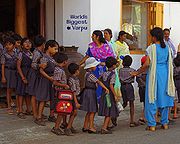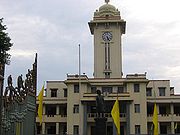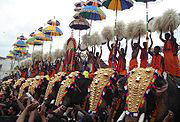The local dynastic precursors of modern-day Kerala sponsored sabha mathams that imparted Vedic knowledge. Apart from kalaris, which taught martial arts, there were village schools run by Ezhuthachans or Asans.
 Kerala school of astronomy and mathematics The Kerala school of astronomy and mathematics was a school of mathematics and astronomy founded by Madhava of Sangamagrama in Kerala, South India, which included among its members: Parameshvara, Neelakanta Somayaji, Jyeshtadeva, Achyuta Pisharati, Melpathur Narayana Bhattathiri and Achyuta Panikkar. The school flourished between the 14th and 16th centuries and the original discoveries of the school seems to have ended with Narayana Bhattathiri (1559-1632). In attempting to solve astronomical problems, the Kerala school independently created a number of important mathematics concepts. Their most important results - series expansion for trigonometric functions were described in Sanskrit verse in a book by Neelakanta called Tantrasangraha, and again in a commentary on this work, called Tantrasangraha-vakhya, of unknown authorship. The theorems were stated without proof, but proofs for the series for sine, cosine, and inverse tangent were provided a century later in the work Yuktibhasa, written in Malayalam, by Jyesthadeva, and also in a commentary on Tantrasangraha. Their work, completed two centuries before the invention of calculus in Europe, provided what is now considered the first example of a power series (apart from geometric series). However, they did not formulate a systematic theory of differentiation and integration, nor is there any direct evidence of their results being transmitted outside Kerala. Kerala school of astronomy and mathematics The Kerala school of astronomy and mathematics was a school of mathematics and astronomy founded by Madhava of Sangamagrama in Kerala, South India, which included among its members: Parameshvara, Neelakanta Somayaji, Jyeshtadeva, Achyuta Pisharati, Melpathur Narayana Bhattathiri and Achyuta Panikkar. The school flourished between the 14th and 16th centuries and the original discoveries of the school seems to have ended with Narayana Bhattathiri (1559-1632). In attempting to solve astronomical problems, the Kerala school independently created a number of important mathematics concepts. Their most important results - series expansion for trigonometric functions were described in Sanskrit verse in a book by Neelakanta called Tantrasangraha, and again in a commentary on this work, called Tantrasangraha-vakhya, of unknown authorship. The theorems were stated without proof, but proofs for the series for sine, cosine, and inverse tangent were provided a century later in the work Yuktibhasa, written in Malayalam, by Jyesthadeva, and also in a commentary on Tantrasangraha. Their work, completed two centuries before the invention of calculus in Europe, provided what is now considered the first example of a power series (apart from geometric series). However, they did not formulate a systematic theory of differentiation and integration, nor is there any direct evidence of their results being transmitted outside Kerala.
 Schools and colleges are now largely run by the government, private trusts, or individuals. Each school is affiliated with either the Indian Certificate of Secondary Education (ICSE), the Central Board for Secondary Education (CBSE), or the Kerala State Education Board. English is the language of instruction in most private schools, while government run schools offer English or Malayalam as the medium of instruction. After 10 years of secondary schooling, students typically enroll at Higher Secondary School in one of the three streams - liberal arts, commerce or science. Upon completing the required coursework, students can enroll in general or professional degree programmes. Kerala topped the Education Development Index (EDI) among 21 major states in India in year 2006-2007. EDI is calculated using indicators such as access, infrastructure, teachers and outcome. Schools and colleges are now largely run by the government, private trusts, or individuals. Each school is affiliated with either the Indian Certificate of Secondary Education (ICSE), the Central Board for Secondary Education (CBSE), or the Kerala State Education Board. English is the language of instruction in most private schools, while government run schools offer English or Malayalam as the medium of instruction. After 10 years of secondary schooling, students typically enroll at Higher Secondary School in one of the three streams - liberal arts, commerce or science. Upon completing the required coursework, students can enroll in general or professional degree programmes. Kerala topped the Education Development Index (EDI) among 21 major states in India in year 2006-2007. EDI is calculated using indicators such as access, infrastructure, teachers and outcome.
Thiruvananthapuram, one of the state's major academic hubs, hosts the University of Kerala and several professional education colleges, including 15 engineering colleges, three medical colleges, three Ayurveda colleges, two colleges of homeopathy, six other medical colleges, and several law colleges. Trivandrum Medical College, Kerala's premier health institute, one of the finest in the country, is being upgraded to the status of an All India Institute of Medical Sciences (AIIMS). The College of Engineering, Trivandrum is one of the prominent engineering institutions in the state. The Asian School of Business and IIITM-K are two of the other premier management study institutions in the city, both situated inside Technopark. The Indian Institute of Space Science and Technology, first of its kind in India, is situated in the state capital.
Kochi is another major educational hub. The Cochin University of Science and Technology (also known as "Cochin University") is situated in the suburb of the city. Most of the city's colleges offering tertiary education are affiliated to the Mahatma Gandhi University. Other national educational institutes in Kochi include the Central Institute of Fisheries Nautical and Engineering Training, the National University of Advanced Legal Studies, the National Institute of Oceanography, Central Institute of Fisheries Technology and the Central Marine Fisheries Research Institute.The only College of Fisheries in the State is situated at Panangad, a suburban area of the City. The College comes under the Kerala Agricultural University.
The district of Thrissur holds some premier institutions in Kerala. Kerala Agricultural University is situated in this city. Thrissur Medical College, The Government Engineering College, Govt. Law College, Ayurveda College, Govt.Fine Arts College, College of Co-operation & Banking and Management, College of Veterinary and Animal Sciences, College of Horticulture, College of Forestry etc are situated in Thrissur. Thrissur is also a main center of coaching for the entrance examinations for engineering and medicine.
Kottayam also acts as a main educational hub. According to the 1991 census, Kottayam District of Kerala is the first district to achieve full literacy rate in the whole of India. Mahatma Gandhi University, CMS College(the first institution to start English education in Southern India), Medical College, Kottayam, and the Labour India Educational Research Center are some of the important educational institutions in the district.
Kozhikode is home to two of the premier educational institutions in the country; the IIMK, one of the seven Indian Institutes of Management., and the premier National Institute of Technology Calicut, the NITC. Calicut Medical College, the second medical college in Kerala is affiliated to the University of Calicut and serves 2/5 of the population of Kerala. Government Law College situated in outskirts of Calicut City is owned by the Government of Kerala and caters to the needs of the entire north Malabar region of Kerala. Pothanicad, a village in Ernakulam district is the first panchayath in India that achieved 100% literacy. |
 Kerala school of astronomy and mathematics The Kerala school of astronomy and mathematics was a school of mathematics and astronomy founded by Madhava of Sangamagrama in Kerala, South India, which included among its members: Parameshvara, Neelakanta Somayaji, Jyeshtadeva, Achyuta Pisharati, Melpathur Narayana Bhattathiri and Achyuta Panikkar. The school flourished between the 14th and 16th centuries and the original discoveries of the school seems to have ended with Narayana Bhattathiri (1559-1632). In attempting to solve astronomical problems, the Kerala school independently created a number of important mathematics concepts. Their most important results - series expansion for trigonometric functions were described in Sanskrit verse in a book by Neelakanta called Tantrasangraha, and again in a commentary on this work, called Tantrasangraha-vakhya, of unknown authorship. The theorems were stated without proof, but proofs for the series for sine, cosine, and inverse tangent were provided a century later in the work Yuktibhasa, written in Malayalam, by Jyesthadeva, and also in a commentary on Tantrasangraha. Their work, completed two centuries before the invention of calculus in Europe, provided what is now considered the first example of a power series (apart from geometric series). However, they did not formulate a systematic theory of differentiation and integration, nor is there any direct evidence of their results being transmitted outside Kerala.
Kerala school of astronomy and mathematics The Kerala school of astronomy and mathematics was a school of mathematics and astronomy founded by Madhava of Sangamagrama in Kerala, South India, which included among its members: Parameshvara, Neelakanta Somayaji, Jyeshtadeva, Achyuta Pisharati, Melpathur Narayana Bhattathiri and Achyuta Panikkar. The school flourished between the 14th and 16th centuries and the original discoveries of the school seems to have ended with Narayana Bhattathiri (1559-1632). In attempting to solve astronomical problems, the Kerala school independently created a number of important mathematics concepts. Their most important results - series expansion for trigonometric functions were described in Sanskrit verse in a book by Neelakanta called Tantrasangraha, and again in a commentary on this work, called Tantrasangraha-vakhya, of unknown authorship. The theorems were stated without proof, but proofs for the series for sine, cosine, and inverse tangent were provided a century later in the work Yuktibhasa, written in Malayalam, by Jyesthadeva, and also in a commentary on Tantrasangraha. Their work, completed two centuries before the invention of calculus in Europe, provided what is now considered the first example of a power series (apart from geometric series). However, they did not formulate a systematic theory of differentiation and integration, nor is there any direct evidence of their results being transmitted outside Kerala. Schools and colleges are now largely run by the government, private trusts, or individuals. Each school is affiliated with either the Indian Certificate of Secondary Education (ICSE), the Central Board for Secondary Education (CBSE), or the Kerala State Education Board. English is the language of instruction in most private schools, while government run schools offer English or Malayalam as the medium of instruction. After 10 years of secondary schooling, students typically enroll at Higher Secondary School in one of the three streams - liberal arts, commerce or science. Upon completing the required coursework, students can enroll in general or professional degree programmes. Kerala topped the Education Development Index (EDI) among 21 major states in India in year 2006-2007. EDI is calculated using indicators such as access, infrastructure, teachers and outcome.
Schools and colleges are now largely run by the government, private trusts, or individuals. Each school is affiliated with either the Indian Certificate of Secondary Education (ICSE), the Central Board for Secondary Education (CBSE), or the Kerala State Education Board. English is the language of instruction in most private schools, while government run schools offer English or Malayalam as the medium of instruction. After 10 years of secondary schooling, students typically enroll at Higher Secondary School in one of the three streams - liberal arts, commerce or science. Upon completing the required coursework, students can enroll in general or professional degree programmes. Kerala topped the Education Development Index (EDI) among 21 major states in India in year 2006-2007. EDI is calculated using indicators such as access, infrastructure, teachers and outcome.

